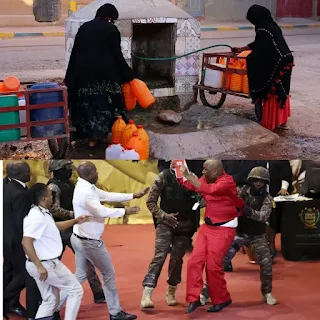Faced with recurring periods of drought, the kingdom is banking on the technique of seawater desalination. Casablanca has launched work on the largest station on the continent.
The objective is to produce 300 m3 of drinking water per year. In focus: the drinking water needs of populations, but also those of the agri-food industry.
The desalination station in the country's economic capital, Casablanca , will have the mission of supplying water to the region of the country's largest city, thus relieving the usual water sources, reserved in the future for agriculture and to breeding.
It should enter its production phase in 2027.
Water stress, dams at almost low storage levels, saturated water tables, an increase in average temperatures of 1.3 degrees Celsius by 2050... Morocco, which is heading towards its sixth consecutive year of drought, is today Today, it is working hard to implement the main lines of its National Program for Drinking Water Supply and Irrigation (PNAEPI) initiated for the period 2020-2027.
Desalination plants have become one of the country's priorities.
In addition to the one in Casablanca, 15 other factories will be built by 2030, according to the Minister of Equipment and Water .
The construction of Casablanca's infrastructure is financed by a consortium led by the Spanish Acciona and two Moroccan companies led by Prime Minister Aziz Akhannouch .
South Africa: Malema banned from attending State of the Nation speech
A South African court on Tuesday upheld a ban on opposition party leaders from attending President Cyril Ramaphosa's speech this week to mark the opening of the new parliamentary session, after were sanctioned for disrupting the event a year ago.
The leader, deputy leader and four other representatives of the Economic Freedom Fighters (EFF) , the third largest party in Parliament , will not be allowed to attend the State of the Nation address on Thursday.
The six MPs were suspended from Parliament from February 1 to 29. They were among a group of EFF members who were ordered out of the room by the speaker for interrupting Mr Ramaphosa 's 2023 speech. But instead of leaving, the group, led by EFF president Julius Malema , jumped on stage and held up signs calling on Mr Ramaphosa to step down before security forced them out.
EFF MPs disrupted parliamentary sessions and fought with security officers on several occasions.
Mr Malema, EFF deputy president Floyd Shivambu and the other MPs took legal action to appeal their suspension. After being rejected, they filed another appeal requesting that the new parliamentary rules under which they were suspended be declared invalid. The Western Cape High Court dismissed the appeal on Tuesday.
Mr Malema, who was expelled from the ruling party in 2012, is known for his controversial policies and has previously been accused by South African-born billionaire Elon Musk of being anti-white and stoking racial tensions .
The left-wing EFF claims to represent South Africa's poor, black majority, which it says has been disillusioned by the African National Congress (ANC) -led government and remains poor due to legacy of the apartheid system of racial segregation , which ended 30 years ago. Their policies are sometimes described as anti-white by their detractors.
EFF MPs often attend Parliament dressed in red industrial work clothes , rubber boots and hard hats like those worn by miners or construction workers, as a sign of solidarity with the southern working class. African . Female members of the EFF wear the uniform of cleaners and domestic workers.
Mr Ramaphosa could use his State of the Nation address to announce a date for this year's national elections , which are expected to be held between May and August.
The ANC has been in power since the end of apartheid in 1994, but this year's vote could mark a turning point for South Africa . Polls suggest the ANC could fall below 50% of the vote for the first time. This would require him to form a coalition to remain in government and keep Mr Ramaphosa as president for a second and final term.





